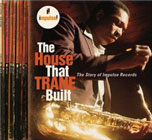Home » Jazz Articles » Album Review » Bill Coleman: The Complete Philips Recordings
Bill Coleman: The Complete Philips Recordings
Coleman would eventually settle in France, where these recordings were made and recently reissued, and where he would co-found the Marciac Jazz Festival. A geographical serendipity allowed him to entitle his memoirs De Paris (Kentucky) à Paris (France).
The Complete Philips Recordings centers around a somewhat rowdy (on and off-stage) October 1952 concert at the Salle Pleyel in Paris, an apparently totemic event for budding French jazz fans of the era. (At least that's the sense conveyed by veteran critic Michel Boujut's dewy-eyed review of this disc in Jazz Magazine.)
In addition to its sentimental value to listeners of a certain generation, however, the concert recording is of real musical interest as well. It's easy to joyfully submit to the crazy juxtaposition of styles in the set list. 1920s chestnuts are played with rollicking gusto, only to be followed by loping 1930s swing numbers, not to mention urbane 1950s vocal R&B.
Similarly, the musicians are a temporal and stylistic grab bag. Drummer Zutty Singleton, having wandered out of the Mezz Mezzrow band, pounds raucously through "When the Saints Go Marching In, "Idaho" and "Drum Face," sounding like a voice speaking to us directly from the New Orleans of another century (which, of course, he is). Trombonist Dicky Wells' playing does nothing to dispel the impression that he was, as he himself admitted, "half-high and half-frozen" during his European sojourn. This condition does not prevent credible, big-hearted solos on "Saints" and "Black and Blue."
Saxophonist Guy Lafitte is consistently good, offering easygoing solos in the Ben Webster manner. Randy Downes is a bop pianist—Singleton is alleged to have approved his membership in a cannabis-induced haze, only to judge him too modern once the smoke had cleared—with a nice feature on "Out of Nowhere." He deftly negotiates the swing numbers, even if Singleton is entirely uninterested in meeting him halfway.
Coleman weaves in and out of this vaguely chaotic mise en scène, playing his lovely solos ("St James Infirmary," "Red Top," "Royal Garden Blues"), singing blues affably, joking with the audience in good French with an upbeat but cool composure to which a Zen monk could aspire.
The two-CD package is complemented by six 1951 studio numbers. These septet tracks, with a far more coherent band and fine arrangements by trombonist Bill Tamper, present Coleman as a quite serious and forward-looking bandleader.
Track Listing
CD1: Jumpin' at the Pleyel; Si jolie; The Blues Jumped Up and Got Me; I'm Coming Virginia; Come On A My House; Tenderly; Knucklehead; Baby Won't You Please Come Home; One O'Clock Jump; Perdido; When the Saints Go Marching In; Ghost of a Chance; Basin Street Blues; Lover Man; Summertime; Jumpin' with Symphony Sid; Trombone Blues; St. James Infirmary; Sheik of Araby. CD2: Red Top; Royal Garden Blues; Solitude; Tea for Two; Chinatown; Drum Face; Muskrat Ramble; Black and Blue; Idaho; Out of Nowhere; Indiana; St. Louis Blues; Jumpin' at the Pleyel; Si jolie; The Blues Jumped Up and Got Me; The Blues Jumped Up and Got Me; Come On A My House; Come On A My House; Tenderly.
Personnel
Bill Coleman
trumpetBill Coleman: trumpet, vocal; Bill Tamper: trombone; Jay Cameron: alto saxophone; William Boucaya: baritone saxophone; Art Simmons: piano; Jean-Pierre Sasson: guitar; Guy de Fatto: bass; Gérard "Dave" Pochonet: drums; Miriam Burton: vocal; Dicky Wells: trombone, vocal; Guy Lafitte: clarinet, tenor saxophone; Randy Downes: piano; Buddy Banks: bass; Zutty Singleton: drums.
Album information
Title: The Complete Philips Recordings | Year Released: 2006 | Record Label: Universal Music France
Tags
PREVIOUS / NEXT
Support All About Jazz
 All About Jazz has been a pillar of jazz since 1995, championing it as an art form and, more importantly, supporting the musicians who make it. Our enduring commitment has made "AAJ" one of the most culturally important websites of its kind, read by hundreds of thousands of fans, musicians and industry figures every month.
All About Jazz has been a pillar of jazz since 1995, championing it as an art form and, more importantly, supporting the musicians who make it. Our enduring commitment has made "AAJ" one of the most culturally important websites of its kind, read by hundreds of thousands of fans, musicians and industry figures every month.





















